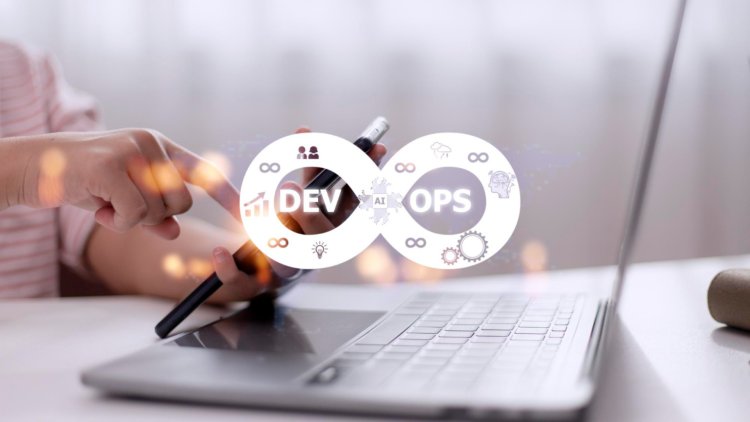DevOps for Enterprise Apps Development: Accelerating Delivery
DevOps is a game-changer for enterprise app development, providing organizations with the tools and practices needed to accelerate delivery while maintaining high quality.
Share this Post to earn Money ( Upto ₹100 per 1000 Views )

Businesses are constantly under pressure to deliver high-quality software products faster and more efficiently. This is particularly true for enterprise applications, where complex integrations and large-scale deployments are the norm. The adoption of DevOps practices has emerged as a transformative solution, enabling organizations to streamline their application development processes, enhance collaboration, and accelerate delivery. In this article, we’ll explore how DevOps can revolutionize enterprise app development and the key practices that can help organizations thrive.
Understanding DevOps in the Context of Enterprise Applications
DevOps is a combination of development (Dev) and operations (Ops) that emphasizes collaboration, automation, and continuous delivery. By breaking down silos between development, IT operations, and quality assurance teams, DevOps promotes a culture of shared responsibility, leading to faster and more reliable application delivery.
The Need for DevOps in Enterprise App Development
Enterprise applications often involve multiple stakeholders, complex requirements, and stringent compliance standards. Traditional development methodologies can be slow and cumbersome, leading to missed deadlines and budget overruns. By implementing DevOps practices, organizations can achieve:
-
Faster Time-to-Market: DevOps accelerates the software development lifecycle, enabling teams to release updates and new features more rapidly.
-
Improved Quality: Continuous testing and integration reduce the likelihood of defects, resulting in higher-quality applications.
-
Greater Collaboration: DevOps fosters a culture of collaboration across departments, leading to better communication and alignment on goals.
-
Increased Flexibility: Organizations can respond more quickly to changing market demands and customer feedback.
Key Practices of DevOps for Enterprise App Development
1. Continuous Integration (CI)
Continuous Integration involves automatically building and testing code changes as they are made. This practice ensures that code is regularly integrated into a shared repository, allowing for immediate feedback on any issues. By catching bugs early, teams can reduce the cost and time required for fixing defects later in the development process. Leveraging enterprise app development services can help organizations set up effective CI pipelines tailored to their specific needs.
2. Continuous Delivery (CD)
Continuous Delivery takes CI a step further by automating the release process. This practice ensures that code is always in a deployable state, enabling teams to release updates at any time with minimal manual intervention. By adopting CD, organizations can reduce deployment risks and improve the speed of delivering new features and fixes to end-users.
3. Infrastructure as Code (IaC)
Infrastructure as Code is a practice that allows teams to manage and provision infrastructure using code and automation. By treating infrastructure in the same way as application code, organizations can ensure consistency, reduce manual errors, and enable rapid scaling of resources. This is particularly important for enterprise applications that require a robust and scalable infrastructure.
4. Automated Testing
Automated testing is essential for maintaining software quality in a DevOps environment. By implementing automated tests at various stages of the development process, organizations can quickly identify and resolve issues before they reach production. This practice not only enhances application quality but also frees up developers to focus on building new features.
5. Monitoring and Feedback
Continuous monitoring of applications in production is crucial for identifying performance issues and understanding user behavior. By gathering real-time data and feedback, teams can make informed decisions about future enhancements and quickly address any problems that arise. This feedback loop helps ensure that enterprise applications remain aligned with business goals and user expectations.
Implementing DevOps in Enterprise App Development: Best Practices
To effectively implement DevOps practices in enterprise app development, organizations should consider the following best practices:
1. Cultural Shift
Successful DevOps adoption requires a cultural shift within the organization. Leadership should promote collaboration, open communication, and shared responsibility among teams. Training and workshops can help facilitate this shift, ensuring that all stakeholders understand the benefits of DevOps.
2. Toolchain Selection
Choosing the right tools is critical for successful DevOps implementation. Organizations should select tools that integrate seamlessly into their existing workflows and support key DevOps practices, such as CI/CD, automated testing, and monitoring. Engaging app developers in Los Angeles can provide insights into the latest tools and technologies that best fit the organization's needs.
3. Start Small
Rather than attempting to overhaul the entire development process at once, organizations should start with small pilot projects. This allows teams to experiment with DevOps practices, learn from the experience, and gradually expand their efforts across the organization.
4. Measure and Optimize
Establishing key performance indicators (KPIs) is essential for tracking the success of DevOps initiatives. Organizations should continuously measure and analyze these metrics to identify areas for improvement. Common KPIs include deployment frequency, lead time for changes, and change failure rates.
5. Encourage Continuous Learning
The field of software development is constantly evolving. Organizations should foster a culture of continuous learning and improvement, encouraging teams to stay updated on the latest trends, tools, and practices in DevOps and enterprise app development.
Conclusion
DevOps is a game-changer for enterprise app development, providing organizations with the tools and practices needed to accelerate delivery while maintaining high quality. By embracing a culture of collaboration, implementing continuous integration and delivery, and leveraging automation, businesses can stay competitive in an ever-evolving marketplace.













